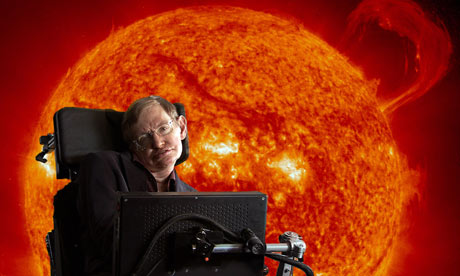Brian Cox is brilliant for science popularity, but TV is not the only means to communicate science. James Grime explains how small videos are making a big difference to the reach of science
I have been recognised four times now. Four times! I knew you would be impressed. And what has brought me such notoriety? Is it my fancy suits, my outrageous tabloid lifestyle, or is it my world famous impression of a teapot? No. I make videos about maths on YouTube.
I am one of a growing number of science communicators on YouTube, and I know many readers could be doing the same. If there is a subject you're passionate about, whatever it is, I want to invite you to join us. In the meantime, here is a favourite video of mine about a surprising mathematical game called non-transitive dice.
I'm a mathematician - and have the chalk marks to prove it - but I do not come from a family of academics. Growing up, my only access to that world was through the television. I remember Johnny Ball jumping up and down talking excitedly about the parabolic path of projectiles; Horizon's documentary on the Andrew Wiles' proof of Fermat's Last Theorem; and at Christmas the theme music of the Royal Institution's Christmas Lectures filled me with even more excitement than the bike that came with six sound effects.
Today the profile of science communication on TV may be at an all time high. My mum may not know what the Large Hadron Collider does, but she knows who Brian Cox is. But television remains a very 20th century method of communication. A channel will gear their science programming towards their perceived audience, be that BBC1 , BBC4 or a Channel 4 audience.
However, with the rise of new media, like YouTube, you no longer need to chase the audience. They find you.
For me, the gold standard of SciComm remains The Periodic Table of Videos. Starting in July 2008, the chemistry department of the University of Nottingham began making a video for each element of the periodic table.
This has now grown into weekly videos, including topical ones such as the chemistry of Kate Middleton's engagement ring (above). It has made unlikely stars of the researchers, the technicians, the professor, and the professor's hair.
'The Professor' is the well respected chemist Martyn Poliakoff, and Periodic Videos has since gone on to create several spin-off channels for other subjects including physics, language, and theology.
It does a great job of humanising the subject.
You get to know these people and their quirks, like The Professor and his collection of periodic table ties.
A slicker (although that may not necessarily be in its favour) hit for science communication online is the TED series, featuring not just talks about science but 'ideas worth spreading'. The main TED conference has been running annually since 1990 and has featured such high profile speakers as Al Gore, Stephen Hawking and Bill Gates. Delegates at the conference are all leaders in their fields. With conference membership next year priced from $7500, this is clearly not affordable. So when they started putting talks online in 2006, the response was huge.
It was at TED that I first heard of Salman Khan, the founder of Khan academy. What started as a series of video maths lessons for his cousins, has now grown into a video resource covering a multitude of subjects such as history, biology, finance and more, and currently stands at over 2000 videos. These may be used by students, teachers, home-schoolers or adult learners. And they are free. This is an example of not just using video and YouTube as science communication, but as an active means of teaching that may reach people without any other access to education.
A few years ago the Journal of Number Theory had the idea of creating a YouTube channel for authors to submit video abstract of upcoming papers. I was very enthusiastic about the idea, but my colleagues were horrified! The idea was not to replace traditional abstract but to give people an alternative.
Today, many universities are actively encouraging their young researchers to engage with the public.
And as it stands, YouTube still gives people the opportunity to stumble across videos they may not have considered viewing before. So instead of simply preaching to the converted (or as well as preaching to the converted), we can now reach an even wider audience. They can then dip into this world in their own time, with no pressure or expectations on them, just as I was able to when watching television growing up.
Could you be doing something? I encourage you to take up the challenge.
James Grime is a mathematician and public speaker, and can mostly be found touring the country on behalf of the Millennium Mathematics Project from the University of Cambridge.
